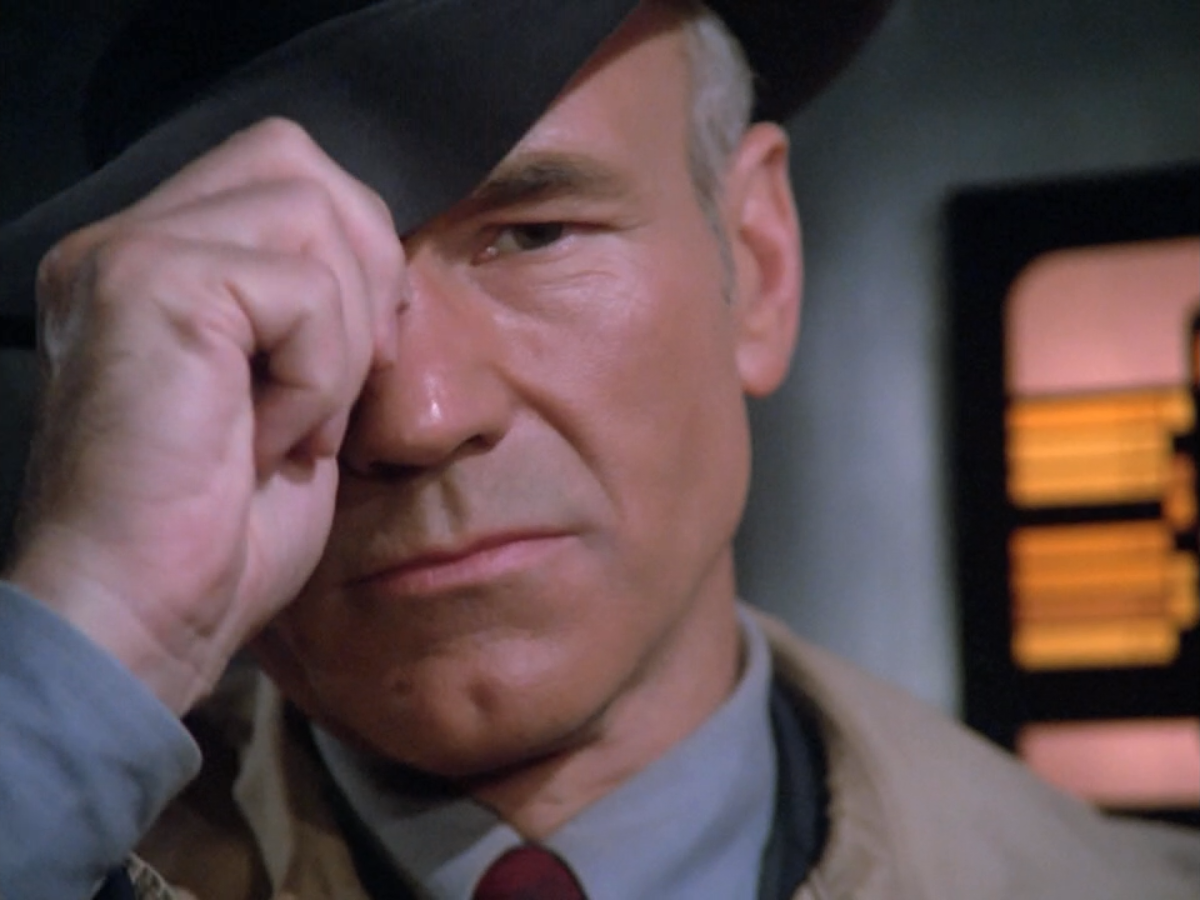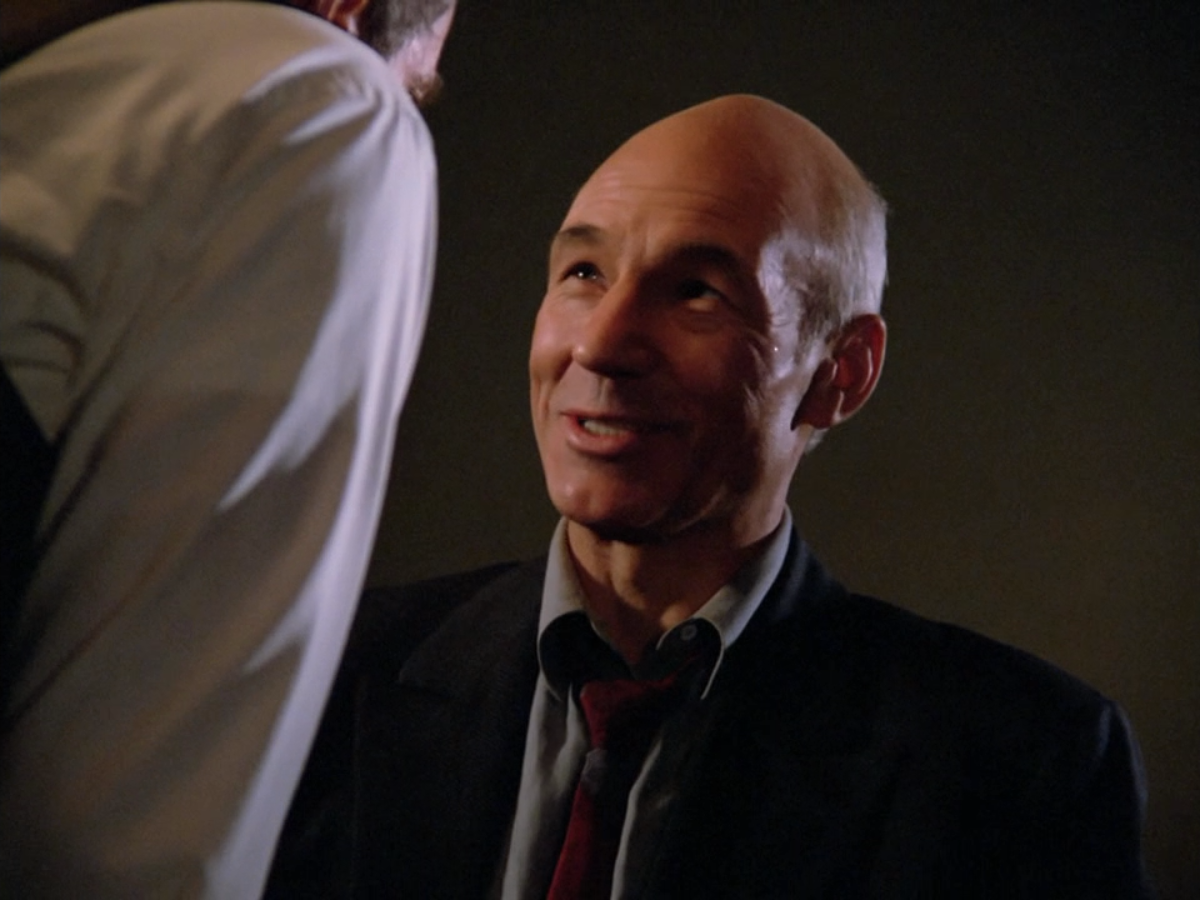Jean-Luc Picard: Hardboiled Hero?
- July 8th, 2014
- Posted in Opinion/Analysis
- Write comment
 Watching Star Trek TNG as a kid, one of the things that I always wondered about was why an upstanding, philosophical guy like Picard would ever want to run around in the 1940s noir-style world of Dixon Hill in his free time. It just didn’t seem like the kind of thing that would appeal to him, and yet it’s one of the few moments in the entire series where we see Picard earnestly having fun. But now, having read some of the most famous books of that time, I think I understand why.
Watching Star Trek TNG as a kid, one of the things that I always wondered about was why an upstanding, philosophical guy like Picard would ever want to run around in the 1940s noir-style world of Dixon Hill in his free time. It just didn’t seem like the kind of thing that would appeal to him, and yet it’s one of the few moments in the entire series where we see Picard earnestly having fun. But now, having read some of the most famous books of that time, I think I understand why.
When most people think of hardboiled detectives and “noir” as a loose genre, their mental image matches pretty well what we see in “The Big Good-bye” : detective in his office, frosted glass, gangsters and femme fatales. There’s a very strict image in the popular culture of what it’s supposed to be, and that extends to the story, too. Incredibly violent, highly sexualized, and overly complicated. But this is a very surface level impression, and without getting too far into a literary analysis of noir, most of this comes from later works, such as the hot-headed Mike Hammer series. The early books, the kind in which these conventions were first set forth, are far more complex and nuanced in their portrayals of the detectives and criminals involved.
Take Raymond Chandler’s Philip Marlowe, for example, whom the character of Dixon Hill clearly draws a lot from. From the first book, The Big Sleep, Chandler is already deconstructing these genre conventions. The woman set up to be the femme fatale isn’t; rather, her faux-innocent younger sister comes closest to filling that role. Marlowe isn’t shallow or violent, instead practicing games of chess (against himself, reenacting famous matches) and making literary allusions, such as the book’s title. He’s far more often the victim of violence than the perpetrator. He’s too clever to fall for the usual tricks his suspects try to pull, which enables him to find the truth, even if it means going against the cops or his own client. Contrary to popular belief, this is more typical of what critics would recognize. One could say that the true defining feature of a hardboiled detective like Marlowe is his moral certitude, such that descending into alleys full of lies and murder and corruption can not sully him.
So how does all this relate to Picard? The most obvious point is Picard’s own moral certitude. Captain Picard is a man who is unwaveringly certain in his beliefs, to the point where he’s willing to argue with god-like beings such as Q to defend them. Admittedly, it’s easy to be moral in the utopian life of a Federation citizen, but Picard is no ordinary citizen. As captain of the Enterprise, he’s out in deep space on his own, and faced with complex moral dilemmas constantly, be it the value of a nonhuman life like Data’s, or dealing with the fate of entire planets. Often times these dilemmas can throw him into conflict with Federation leadership, perhaps most notably in the film Insurrection, where the Enterprise crew stand by Federation ideals and principles when Federation leadership didn’t. Navigating the morally complex realm of the film noir, where even the authorities can’t be counted on, would be a familiar and appealing challenge for him. To be that strong-willed man in a world that doesn’t respect these humanistic beliefs, this dedication to the truth, that would be real strength of character.

Picard says his Big Goodbye, giving the episode a contemplative moment that was much needed in season 1 TNG.
Picard shares a number of other qualities with the Marlowe-esque private detective as well. Both have a tendency toward loner behaviors; Picard is held back by his position as the captain, forced to keep the other crewmembers at a distance. This is particularly problematic for him when it comes to Beverly Crusher, albeit in a more romantic capacity. The archetypal detective is forced to keep a professional distance between himself and his female client as well, for he can’t risk getting emotionally involved and allowing her to interfere in his investigation. This was even alluded to in the episode by having Crusher enter the holodeck dressed as the femme fatale. There’s also the aforementioned dedication to the truth–“be it scientific truth or historical truth or personal truth,” to quote the man himself. The hardboiled detective always solves his case, but he doesn’t always turn in the culprits or even catch them. In the end, he solves the case because he must, and what to do with the truth he discovers is his burden alone. A burden we know that this man can be trusted with, because we know he will do the right thing.
Raymond Chandler once wrote an essay on the state of the murder mystery, which he concluded with this description of his ideal detective:
Down these mean streets a man must go who is not himself mean, who is neither tarnished nor afraid. The detective in this kind of story must be such a man. He is the hero, he is everything. He must be a complete man and a common man and yet an unusual man. He must be, to use a rather weathered phrase, a man of honor, by instinct, by inevitability, without thought of it, and certainly without saying it. He must be the best man in his world and a good enough man for any world. … He is a lonely man and his pride is that you will treat him as a proud man or be very sorry you ever saw him. He talks as the man of his age talks, that is, with rude wit, a lively sense of the grotesque, a disgust for sham, and a contempt for pettiness. The story is his adventure in search of a hidden truth, and it would be no adventure if it did not happen to a man fit for adventure. He has a range of awareness that startles you, but it belongs to him by right, because it belongs to the world he lives in.
And for a man like Picard, one of the greatest heroes the Federation could ever ask for, I can think of no better role to model himself on.






No comments yet.